Jack Ketchum from the ‘Offspring’ Movie Set / Part 1
By, Martel Sardina
It’s Saturday, August 9, 2008 at 7:16 am. The only reason Jack Ketchum is out of bed this early is the call time for his cameo, as Max an EMT, in the film adaptation of his novel, Offspring (sequel to his first novel, Off Season). In the first part of our two-part interview, Ketchum gives Dark Scribe Magazine’s Martel Sardina an all-access pass to the day’s film shoot and a behind-the-scenes peek at the upcoming Offspring adaptation and discusses the story’s journey from print to the big screen.
Dark Scribe Magazine: When writing the screenplay for Offspring, how did you factor in the backstory of Off Season considering that you couldn’t make that film first due to an issue with the film rights?
Ketchum, director Andrew van den Houten, and Art Hindle discuss Ketchum's upcoming cameo scene.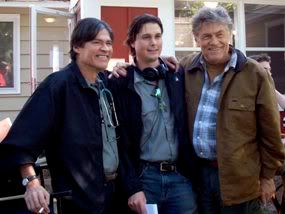
After I turned it into a script, I had some misgivings about it. I really wanted to get something in there about where they came from. I also wanted a moment of poignancy for The Woman who is otherwise just ferocious through the entire film. I had this notion where I wanted to have her looking out from the cave to the island from which they came. I called Bill to discuss this with him and he said, ‘Geez, we’ve just had the same discussion here. We think it needs a little backstory.’
I wrote a paragraph with Peters and the deputies, where Harrison
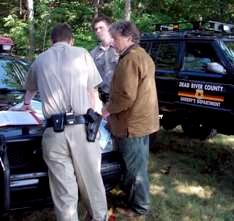
Dark Scribe: Is there any chance you can get the rights to Off Season back?
Jack Ketchum: That I can’t talk about.
Dark Scribe: Speaking of the film rights issue, if you were giving advice to a new writer, what would you tell them to do (or not to do) based on your experience with Off Season?
Jack Ketchum: I would tell them to absolutely vet the person your dealing with. With Off Season, I’d gotten so many options on it that I just started figuring it’s never going to get made. I didn’t do my homework and I regretted it.
My advice would be: make sure that the people you’re working with have the track record. Make sure you’re on the same page in terms of how they want to treat the source material. Conference first, and then sign the contract. If you’re not happy with the conference, don’t do it.
Dark Scribe: Why did you decide to write Offspring as a screenplay?
Jack Ketchum: I didn’t. I was asked to do it by Andrew. Andrew knew about what happened with Off Season and I said, ‘Yeah, I’d really like to just get that out from under but I can’t.’ He said, ‘Throw me a copy of Offspring and maybe we can do something.’
Bill had already read it and he was enthusiastic from the get-go. When Andrew read it, he was traveling in Europe or someplace, and when he got back he said, ‘I think we can do this and I’d like you to write the screenplay.’ So I said, ‘Sure,’ and that was that.
Dark Scribe: Andrew and Bill are the producers?
Cinematographer Bill Miller behind the camera.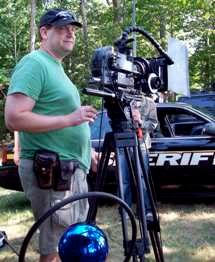
Dark Scribe: This is your second project with them?
Jack Ketchum: Yes. I was really happy with The Girl Next Door. I felt comfortable. They were pre-vetted.
Dark Scribe: As far as casting for the film is concerned, are you involved in that at all?
Jack Ketchum: Not at all.
Dark Scribe: How much creative control do you have now? You wrote the screenplay, now are you just kind of stepping back and letting them do their thing?
Jack Ketchum: Yeah, they’ve called me on a couple of occasions for clarification on a couple of things. The nice thing about this group, and all of the people I’ve worked with thus far, is that they’ve all wanted to have my input in terms of consulting once it got started and even before it got started.
In terms of casting, they did run most of the names by me so I could look them Ketchum discusses character motivation with Art Hindle.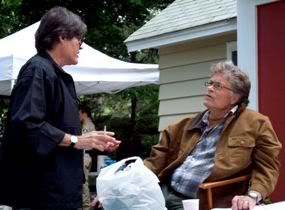
Most of the time, they [the filmmakers] don’t want the screenwriter or the author on set. They think that you’ll just get in the way. At least that’s what I’m told. In all three cases - four now, counting this - to be included is really cool.
Fans concerned about 'Offspring's' visceral content being played down needn't worry with makeup FX artist Anthony Pepe on the scene!
Jack Ketchum: I didn’t. My mandate from Andrew was to just write it and put in everything I wanted. If at some point we need to cut back, we’ll cut back. That sounded fine to me. I had free reign to put it all in, so I did.
Dark Scribe: How do you think this film is going to differ from something similar like The Hills Have Eyes?
Jack Ketchum: It’s got real characters. The Hills Have Eyes is a fun movie, each version of it, though I like the original best. But, the characters are cardboard. Here you’ve got the relationship between the two best friends, who go back to their college days. You’ve got the relationship between Claire and her son, the protection of the infant - even the responses between Claire and her ex-husband. You got some things going on beyond will the family survive or not? It’s how it will happen. What will happen to their friendships and their loves? I think that’s what makes it different. Again it’s not about the cannibals, it’s about the people.
Dark Scribe: When you were writing the scenes with the cannibals, not just for the film but also in the novel, did you feel
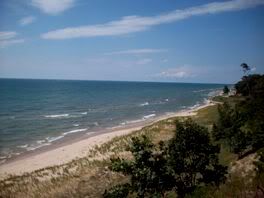
Jack Ketchum: The cannibals are very…other. They’re human but they’re not like you or I. They do something that you and I would never think of doing. At least most of us wouldn’t, anyway.
In that sense there’s an easier connection to be drawn between someone like yourself and Ray Pye. Or somebody like you and Ruth in The Girl Next Door. You can relate better. Because you’re dealing with a clan, it’s hard to do backstory for each individual in the clan.
In Offspring, there’s a strong focus on The Woman, the leader of this clan and on her connection to her now all deceased family and her new family that she’s brought up. I think she’s fairly three-dimensional.
Dark Scribe: I think there was an improvement in that connection between the two books. Offspring seemed to be more connected. In Off Season, it was ‘OK, here’s this bunch of crazy people that are out here doing all these bad things…’

Don’t forget, ten years transpired between the books. Though I like Off Season a lot, I learned a lot as a writer about how to draw characters. Offspring has the benefit of ten years of experience.
Dark Scribe: How hard is it for you to write about violence against children? Does that change when the children are the victims versus the monsters? Is one harder or easier?
Jack Ketchum: Hmm…that’s interesting. I’ve got to think on that for a second.
I don’t have children. This particular boy [in Offspring], Luke, is based on a real boy. I understand this particular boy in real life. Children, in general, I don’t. (laughs) It’s like they’re ‘other.’ (laughs) I see them in New York and think, ‘They’re doing stuff I don’t understand at all.’ I have to think back and try to recapture what I was at that age. But it ain’t easy.
It’s a lot easier for me to write violence against children than it is to write violence against animals because I’m surrounded by animals. I guess my empathy is stronger with animals than it is with humans. I’ve been criticized for that in the past on a personal level, i.e. ‘you care more about your cat, than you care about me.’ Maybe there’s some truth to that, I don’t know.
But in Offspring, you’re right, there’s a good bit of violence against children. God, that’s a tough question. I’ve never really examined that. I don’t know if it makes any difference if they are in the hero category or the villain category.
Violence against children is right up there with incest and cannibalism – it's a taboo, a big no-no. To my mind, rightly so, of course. Still, it happens, God knows, and it's my business in part to write what happens so that you can see it and experience it to some degree – without actually being harmed by it.
It's no more or less difficult to write about, though, than any other violence, which is never exactly easy on the writer. You have to dig in with both hands, and if it's going to be any good, if it's going to work, you have to imagine it as truly as possible, write it to have as much impact as possible. And it doesn't matter at all if the kid's a good guy or a villain. You want your scene to harm the reader? Then you'd better harm yourself first. Straight across the board.
Dark Scribe: In terms of screenplay writing in general, had you ever written a screenplay prior to Offspring?
Jack Ketchum: Yes. I did one based on Ladies Night. I had gotten a pretty decent contract and was making decent money, so I had enough money in the bank that I could take a gamble on taking a year out of my life to try writing screenplays and then try to peddle them. I’d been interested in films since I was a kid. So I did. I wrote four.
One was an adaptation of Ladies Night and the other three were stand-alones. One of which is The Passenger - which Lucky McGee has an option on now and has for quite awhile - one was based on a true story about vets who’d come back from WWII, and the third one was Old Flames. I was unhappy with Old Flames and really didn’t shop that around very much. I did eventually get an agent for it, but it didn’t work out.
Dark Scribe: Old Flames was a screenplay before it was a novella?
Jack Ketchum: Both Old Flames and The Passenger started out as screenplays. When I did The Passenger, that I was really happy with. I also started a fourth, which became The Crossings, a western.
When I did The Passenger screenplay I thought it was the strongest of the four. Although, I liked Ladies Night, too. When nothing happened with them, I shopped them around for a couple of years then put them all back in a file.
Then I was asked to do a novella, and I thought I’d like to do The Passenger as a novella. I pulled out the screenplay and realized that you can get away with a lot of shit in a screenplay that you can’t get away with in prose. I changed a good bit of it and made it much more palatable to me, as a writer. Then went back and rewrote the film script based on what I’d done with the novella. Lucky had asked me if I had anything prepared as a film script that was ready to go. I showed him that and he optioned it and has had it now for a couple of years.
I like the form. It’s fun.
Dark Scribe: Did you do anything specific to learn the craft of writing screenplays? Take a class? Read books on it?
Jack Ketchum: I read a number of screenplays. I read William Goldman’s [Butch Cassidy and the Sundance Kid, Marathon Man] book. He’s got a really good book on screenwriting. He considers Chinatown to be the perfect movie. He breaks down Chinatown into its various elements. It’s a really good book. I read that a couple of times. I’ll have to see if I can find you the title. I think it might be something like “On Screenwriting” or something. But beyond that, no. That taught me the form. Beyond that, I just read a bunch of screenplays...
Dark Scribe: …and sat down and did it.
Jack Ketchum: I got down the time thing. You have to break [the story] down into the three-act structure, which you don’t necessarily have to do with a novel. I think I almost do that anyway. My novels are pretty screen ready.
Dark Scribe: What do you think is easier: writing the novel, writing the stand-alone screenplay, or writing the adaptation?
Jack Ketchum: The hardest of the three is writing the adaptation. I’ve learned that the hard way with Offspring because I hadn’t made a floor plan of the house for the book.
There’s a home invasion and I had done a floor plan for Off Season because I had an early reader who insisted that I do because I fucked that up, too. ‘There’s a window they’re not a door, you idiot!’ (laughs)
But in this one, I had a staircase where there wasn’t any. I had a kitchen on the second floor, which it shouldn’t have been. It should’ve been on the first floor, but it wasn’t. So I spent a day wracking my brain trying to figure out how I could get this right. I had a talk with Bill. At some point during the talk, the bell rang. And I thought, ‘Oh, I can add a bedroom upstairs in the attic – that’s how I can get around the staircase! And the kitchen? I’ll just omit the kitchen.’ So that’s not in the screenplay anymore. It’s harder.
Also, Offspring is set in kind of a real-time format like Off Season, but it’s told from multiple points of view. It was hard to get

Writing the stand-alone screenplay is probably the easiest of the three. All you have to do is think of your story and your characters and fit them into the timeslots, the three-act time slots. A novel takes a lot more preparation. It involves stuff that a movie doesn’t, like internal monologue and backstory, which are much more important in a novel. Also, tone. For a novel, you have to figure out what it’s supposed to sound like in the reader’s ear. With a screenplay, you think about the dialogue in that sense. In terms of actual stage direction – film direction - that can be any kind of prose. You want it tight. You want it neat. You want it to be evocative, but it doesn’t have to be literary.
Dark Scribe: Any other screenplays in the pipeline?
Jack Ketchum: I’m working on revising the screenplay for Old Flames. I’m doing it for Chris Sivertson, who directed The Lost. And he directed The Lost pretty damn nicely, so I’m hoping this one gets done.
Offspring is a MODERNCINÉ production and is scheduled for release in 2010.
Also visit makeup FX artist Anthony Pepe online.
All photos courtesy of Martel Sardina. Used with permission.
Coming up…
In Part 2 of our in-depth chat with Jack Ketchum, the dark scribe speaks at length about his iconic horror novel Off Season, the challenges of getting it into print, and what he learned in the decade between Off Season and its sequel Offspring.
Catch it next week right here at Dark Scribe Magazine!




Reader Comments